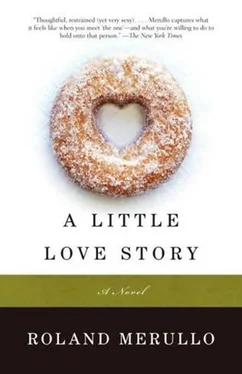In the first blush of monastic infatuation, Ellory had been in the habit of sending me letters that always ended with a kind of eager encouragement. “The Lord’s gifts come in strange wrapping,” he’d write. Or “Pain is a blessing.” Or “Pray every second.” Things like that. It got so bad that, whenever Gerard or I banged a finger with the hammer, or dropped a crowbar on a toe, or tripped over a sole plate and went crashing into a wall, the other person would immediately say, “Pain is a blessing.”
But Ellory and I had always been close, in spite of the age difference, and his godly enthusiasms didn’t really put much distance between us. It seemed to me that he was at least as happy and well balanced as most of the non-monks I knew. On the four days a year when he was allowed visitors, I took my mother down there-it was less than three hours from Boston-and we had a meal with him and some of the other monks, his friends. Since a piece of her mind had been carted away, my mother had come up with the idea that my brother’s name was my name-John-and that he was, for some reason, an airline pilot, always in uniform, living in a mansion with all his pilot friends.
With time, Ellory had evolved an individualistic interpretation of the monastery rules. He was still celibate, as far as I could tell, though he told me he missed the company of women more than anything else. He observed a strict fasting regimen during Lent, and said formal prayers either six or ten times a day, I could never remember. But every few months I went down and visited him, in an unofficial way, sneaking through the woods to his hermitage, and he always broke the rules a little bit then. He always wanted me to smuggle onto the monastery grounds exactly one pack of Marlboro cigarettes. If it wasn’t Lent, I might bring him a bottle of red wine and some Jarlsberg cheese and good bread. Or a few cigars. Or some copies of Sports Illustrated (not the swimsuit issue). Once, on his thirty-third birthday, we arranged to meet at the side of the nearest road and I brought a change of clothes and spirited him off to a golf course for nine holes.
He was a good, devoted monk, and a good man. These were things he did, little things, ten times in a year maybe, to maintain some sort of interior balance. Even the pope, he pointed out to me, had sneaked away from Vatican City to go skiing once or twice when he was younger. “God doesn’t want machines, Jake,” he liked to say, after he’d been there awhile and had stopped ending his letters with “All the good Lord asks of us is that we think of Him.”
I said I didn’t know what God wanted anymore.
And he said, not in a preachy way, “You know right from wrong, Jake. God is just the part of you that knows right from wrong.”
“Sure,” I said. “Stalin had that part, too. Hitler. Mussolini. Idi Amin. They were all sure they knew right from wrong. So were nineteen assholes with box cutters.”
But by the time I took Janet there, Ellory and I had stopped having conversations like that. We just did what we did. He was a monk, I was a painter. I banged nails, I punched governors. His part of my father’s inheritance had gone to the monastery. My part had gone to buy the apartment I lived in. My sister’s part had gone into pharmaceuticals and roulette. We knew what was right and wrong and we wanted to serve our own little selfish demons, and balancing those things was called life.
I didn’t usually sneak up to the hermitage at night, though, unannounced. And I had never taken a girlfriend there.
For dinner, Janet and I stopped at a sub shop in Sturbridge-still a bit of bad air between us-and I had the pierced, beringed, and bespectacled young man make an Italian with everything on it, to go, for Ellory, and then bought the cigarettes at a convenience store in the same little strip mall, where another pierced and tattooed young fellow asked me to show my ID.
ON A QUIET, two-lane highway not far from the monastery there was an unmarked dirt parking area large enough for two cars, nothing but woods all around. Hunters used it in fall and spring. Teenagers probably used it as a lovers’ lane. I had used it a dozen times to make my clandestine visits to my brother. I pulled the truck off the road there and killed the lights. Janet and I locked the doors and walked up the highway to the spot where I had met Ellory on the day we’d gone golfing. From there we stepped off onto an old logging road that had almost been reclaimed by the forest, an old wound, mostly healed. I kept a cigar-sized flashlight in the glove compartment, and had remembered to bring it, so we had a little light to work by, and a three-quarters moon, and, for Janet, even in sneakers and a partly buttonless dress, the going wasn’t too bad.
She’d been out of the hospital only a week and wasn’t coughing very much at all, but even so her lungs were functioning at only about thirty-five percent of capacity, so I went along at a slow pace. The visit was foolish in several ways, but I had mentioned Janet to Ellory in a letter, and he’d written back saying I should bring her to the next family day, which was scheduled for the start of January. But I knew that when Janet’s lung capacity dropped into the mid-twenties, which it would the next time she caught a cold, it would not be very easy to take her walking in the woods, or on a ride to the monastery, or much of anywhere else.
It was about half a mile on the trail. We stopped twice to rest. Janet did not like me to see how out of breath she was, so when we stopped she stayed a couple of steps away from me and turned her back. I pretended I’d found some interesting mushroom or something to study in the beam of my little flashlight. From things that had happened in my own life during the previous year, I knew about pity and what it ruined. My promise to myself, from the night I’d first typed the words “cystic fibrosis” into Gerard’s computer, had been that, no matter what else I did, I was going to steer my feelings for her a hundred and fifty miles wide of pity.
So I waited for her to say she couldn’t do something-couldn’t make love, couldn’t come into my studio because of the fumes, couldn’t walk a flat half-mile in the woods-but she never said that. I sometimes thought of her toughness as an iron bar running up her spine. Other times I thought of it as a fire in her chest. Once in a while, on my three-times-a-week morning runs, I’d find a long steep hill and sprint up it as hard as I could, just to feel the pain of wanting breath, and to realize she felt some version of that pain for most of her waking hours.
Soon enough the woods ended and there were open, almost-flat hayfields coated in silvery light, and an old rail fence with signs every thirty feet: MONASTIC ENCLOSURE, PLEASE KEEP OUT.
We ducked under the top rail. Crossing the hayfield, I took her hand. By then we had left the State House behind, it seemed to me, though my face hurt where the governor had scratched it, and my ribs and shoulder where he had practiced his judo on me. Janet’s hand felt hot against my palm and I had an urge to stop and lay her down in the sweet grass and make peace that way. I put the flashlight in my front pocket, then took it out and put it in my back pocket. We crossed a low rise and could see Ellory’s cabin ahead another eighty yards. The only window was an ocher rectangle, but as we got closer the light went out.
“He’s just going to bed,” I told Janet quietly. “It’s good, he’ll be done with his prayers, he’ll be hungry.”
We walked up to the cabin and I tapped on the door three times, two quick, soft knocks then a pause, then one sharp knock. In a minute the light came back on. Another minute and Ellory opened the door, any ordinary, nice-looking thirty-eight-year-old in a bathrobe, little spark of devil in the eyes.
Читать дальше












